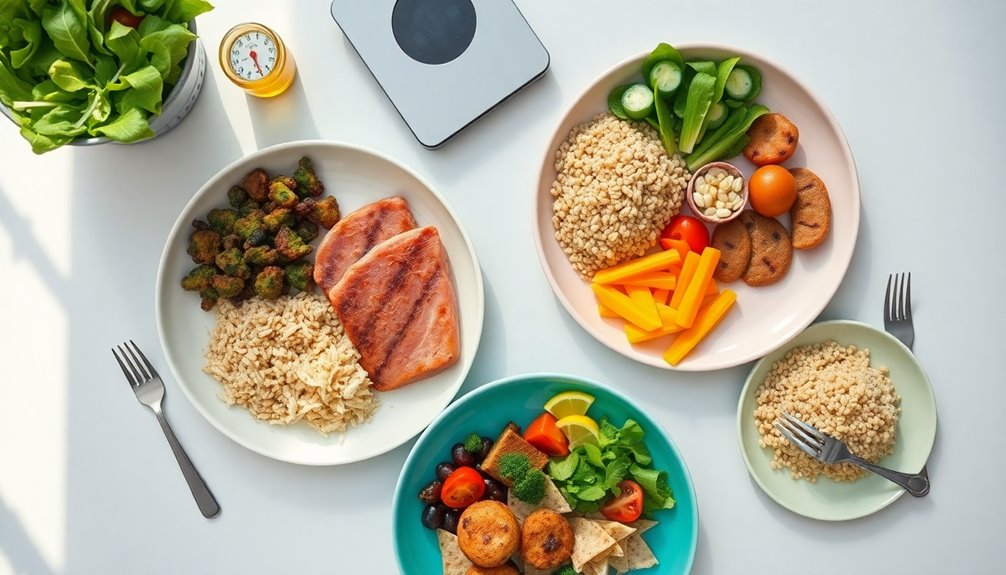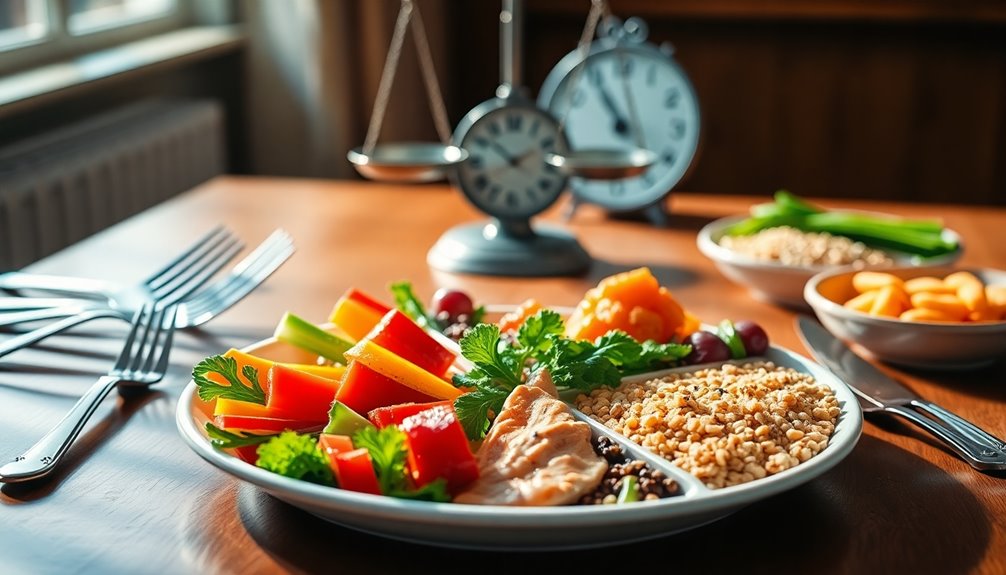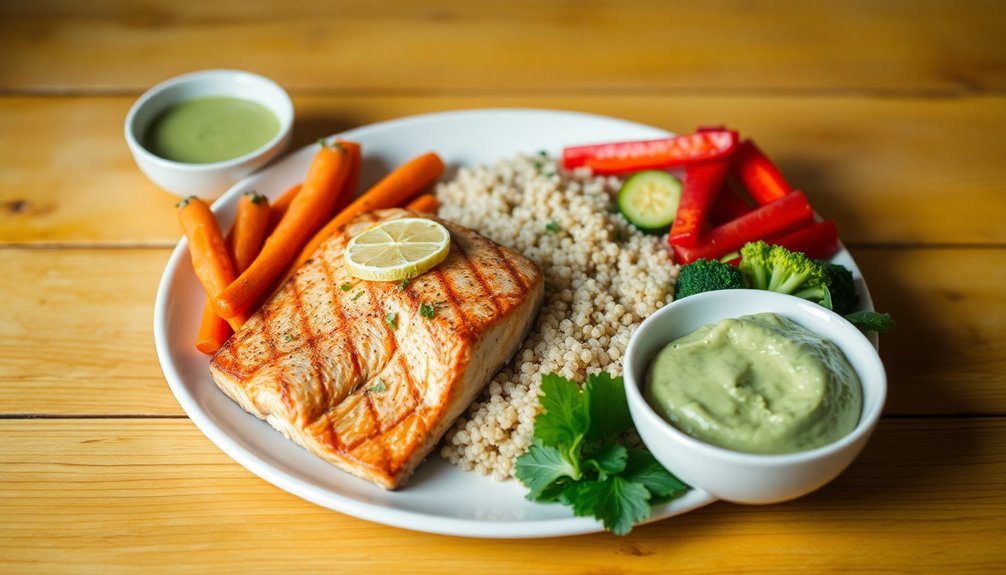Portion sizes play an essential role in maintaining a balanced diet and overall health. They help you control calorie intake, preventing overeating and weight gain. Many people underestimate how much they consume, often leading to unwanted health issues. Adjusting your portion sizes can promote nutrient balance and enhance satisfaction from smaller portions of high-quality foods. By incorporating mindful eating and practical strategies, you can effectively manage your weight and enjoy your favorite foods in moderation. Understanding the impact of portion sizes is the first step toward healthier eating habits that truly benefit you. Discover more about optimizing your diet for better health.
Key Takeaways
- Understanding portion sizes helps prevent overeating and supports weight management by controlling calorie intake.
- Smaller portions of high-quality foods can lead to greater satisfaction and balanced nutrition.
- Mindful eating and portion control strategies enhance the relationship with food and promote healthier habits.
- Proper portion sizes are essential for maintaining nutrient balance and supporting overall health.
- Adjusting portion sizes allows for moderation in enjoying favorite foods while achieving weight management goals.
Understanding Portion Sizes

Understanding portion sizes is essential for maintaining a balanced diet and managing your overall health. When you're aware of portion sizes, you're better equipped to make informed food choices that align with your nutritional goals. Portion size awareness allows you to enjoy a variety of foods without overeating, which can lead to unwanted weight gain and other health issues.
To help you navigate this, familiarize yourself with serving size guidelines. These guidelines provide a framework for how much of each food group you should consume. For instance, a serving of cooked pasta is typically about one cup, while a serving of vegetables is around half a cup. Paying attention to these measurements helps you gauge your intake accurately.
It's important to remember that portion sizes can vary based on factors like age, activity level, and individual health goals. Implementing natural calorie cycles can also help in understanding how to balance your portions effectively.
When dining out, portions can be considerably larger than recommended, so consider sharing dishes or taking leftovers home. At home, use measuring cups or a food scale to help you establish a better understanding of what a proper portion looks like.
The Role of Calories

Calories play a substantial role in your diet, serving as the primary source of energy for your body. Understanding how they work can help you make informed choices about what you eat. Every food contains a specific number of calories, which are necessary for fueling your daily activities, from simple tasks to intense workouts. However, not all calories are created equal, and that's where calorie counting comes into play.
When you track your calorie intake, you're gaining insight into how much energy your body needs versus how much you're consuming. This awareness can guide you toward healthier choices and help maintain a balanced diet. Combining calorie counting with portion control is vital. By understanding portion sizes, you can make sure you're not just looking at calories but also the nutritional value of what you're eating.
Practicing portion control means being mindful of the amount of food on your plate. It helps prevent overeating and encourages you to savor each bite.
You might find that smaller portions of higher-quality foods can be more satisfying than larger portions of lower-quality ones. A well-planned plant-based diet can also provide the essential nutrients your body needs while helping to manage your calorie intake.
In a world filled with tempting options, recognizing the role of calories and practicing portion control can foster a sense of belonging to a community that values health. Remember, it's not just about cutting calories; it's about making choices that nourish your body and support your lifestyle. This balanced approach can empower you to enjoy food while still meeting your energy needs.
Effects of Overeating

Overeating can lead to a range of negative health effects that impact both your physical and mental well-being. When you consistently consume more calories than your body needs, you may experience various health consequences. Recognizing these effects is crucial so you can adopt mindful eating habits and create a healthier lifestyle.
Here's a quick overview of some common effects of overeating:
| Physical Effects | Mental Effects | Long-term Consequences |
|---|---|---|
| Weight gain | Guilt and shame | Increased risk of obesity |
| Digestive issues | Anxiety | Heart disease |
| Fatigue | Depression | Type 2 diabetes |
| Metabolic changes | Low self-esteem | Chronic inflammation |
When you overeat, your body struggles to process the excess food, leading to digestive issues like bloating and discomfort. Additionally, weight gain can strain your joints and increase your risk for chronic health problems. Mentally, overeating can create a cycle of guilt and anxiety, making you feel worse about your choices. Incorporating low-carb, anti-inflammatory foods into your diet can help reduce inflammation and support healthier eating habits.
To combat these issues, focus on mindful eating. This involves paying attention to your hunger cues, savoring each bite, and avoiding distractions during meals. Embracing this approach can help you develop a healthier relationship with food and mitigate the negative effects of overeating. Remember, small changes in your eating habits can result in significant improvements in your overall well-being.
Nutrient Balance

Achieving a proper nutrient balance is vital for maintaining peak health and supporting your body's functions. When you focus on nutrient density, you're ensuring that the foods you consume are packed with vitamins, minerals, and other beneficial compounds relative to their calorie content. This means choosing foods that offer more nutritional value without excessive calories, helping you feel full while nourishing your body effectively.
Incorporating a wide range of foods into your diet promotes food variety, which is pivotal for getting all the essential nutrients your body needs. Each food group contributes unique nutrients, so mixing fruits, vegetables, whole grains, lean proteins, and healthy fats can help you meet your nutritional requirements. By diversifying your food choices, you not only enhance your meals' flavor and texture but also support a robust immune system and overall well-being. Additionally, following a custom keto diet plan can provide tailored meal options that align with your nutrient goals.
Practical Portion Control Tips

To fully benefit from a balanced diet, understanding portion control is key. Practicing mindful eating can greatly enhance your relationship with food. This means paying attention to what you eat, savoring each bite, and recognizing when you're satisfied. It's about being present during meals and appreciating the flavors, textures, and aromas of your food.
One effective way to practice portion control is through food measuring. Start by using measuring cups or a food scale to determine appropriate serving sizes. This helps you visualize what a proper portion looks like. Once you've established a baseline, you won't need to measure every meal; you'll develop an intuitive sense of portion sizes.
Another tip is to serve food on smaller plates. Research shows that using smaller dishes can deceive your brain into thinking you're eating more, which can help you feel satisfied with less. Additionally, consider pre-portioning snacks into small containers instead of eating directly from the bag. This can prevent mindless munching and encourage you to stick to a sensible amount.
Lastly, don't forget to listen to your body. Sometimes, you might eat out of habit rather than hunger. By tuning into your body's signals, you can better recognize when to stop eating. Incorporating mini band workouts into your routine can also support your overall wellness journey. These practical tips can help you cultivate a healthier relationship with food, making portion control a manageable part of your daily routine. Embracing these strategies not only supports your wellness journey but also fosters a sense of community with those around you who share similar goals.
Portion Sizes and Weight Management

Managing your weight effectively hinges on understanding portion sizes. When you grasp the concept of portion control, it becomes easier to make healthier choices that lead to weight loss. Many people underestimate the impact that portion sizes have on their overall calorie intake. By adjusting your portions, you can enjoy your favorite foods while still maintaining a balanced diet.
Here are some key strategies to help you with portion control:
- Use smaller plates and bowls to create the illusion of a fuller plate.
- Measure out servings instead of eating straight from the package to avoid mindless snacking.
- Pay attention to hunger cues and eat slowly, allowing your body time to signal when it's full.
Research shows that even small changes in portion sizes can make a significant difference in your weight management journey. For instance, reducing your portion sizes by just a few bites can lead to a gradual decrease in overall calorie consumption. Additionally, programs like the 3X Diet System have been shown to enhance metabolism and promote weight loss.
This isn't about depriving yourself; it's about finding a balance that works for you.
Frequently Asked Questions
How Do Cultural Differences Affect Portion Size Perceptions?
Cultural differences greatly influence how you perceive portion sizes.
In some cultures, social norms emphasize large meals as a sign of hospitality, while others prioritize moderation.
Economic factors also play a role; in wealthier societies, larger portions might be common, reflecting abundance, whereas in less affluent regions, smaller portions may be the norm due to resource availability.
Understanding these variations can help you navigate social settings and make informed choices about portion sizes.
Can Portion Sizes Influence Mental Health and Body Image?
Think of your mind as a garden; what you feed it can shape its growth. Portion sizes do influence mental health and body image by impacting emotional eating patterns. When you practice portion control, you're not just managing food intake; you're nurturing a healthier relationship with yourself.
Studies show that balanced portions can promote positive self-image and reduce anxiety around food, fostering a sense of belonging and contentment within your own skin.
What Tools Can Help Measure Portion Sizes Accurately?
To measure portion sizes accurately, you can use several helpful tools. Visual aids, like photos of standard serving sizes, provide quick references. Digital scales help weigh food precisely, ensuring you're not overindulging. Portion control plates guide you in dividing food into the right amounts, while measuring cups help with liquids and grains. By incorporating these tools into your routine, you'll feel more confident about your portions and maintain a healthy balance in your meals.
Are There Age-Specific Portion Size Recommendations?
Imagine a world where everyone eats like toddlers—tiny plates piled high with food! But really, age-specific portion size recommendations are essential.
You've got portion size guides that cater to different life stages, addressing varying nutritional needs. For example, kids need smaller servings to match their growth, while adults require more for energy.
Paying attention to these recommendations helps you maintain a balanced diet and guarantees everyone belongs to the healthy eating club.
How Do Portion Sizes Impact Food Waste Levels?
Portion sizes greatly influence food waste levels. When you practice portion control, you're not just managing your plate; you're reducing the environmental impact of discarded food.
Smaller, more suitable servings lead to less waste, promoting sustainability. By being mindful of how much you serve, you can enjoy your meals without excess, fostering a sense of belonging in a community that values responsible consumption.
Together, we can make a difference in reducing food waste.
Conclusion
In your journey toward a balanced diet, think of portion sizes as your guiding compass. By charting these portions wisely, you steer clear of the stormy seas of overeating and guarantee a harmonious blend of nutrients. Embracing mindful eating habits not only helps you maintain a healthy weight but also nourishes your body effectively. Remember, it's not about deprivation; it's about savoring every bite while keeping your plate well-balanced and your health thriving.



